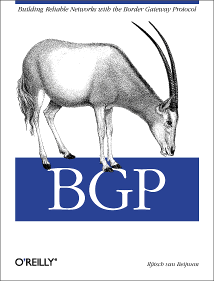
|

|

|
|
Home ·
BGP Expert Test ·
What is BGP? ·
BGP Vendors ·
Links ·
Archives ·
Books ·
My New BGP Book | ||
 (advertisement)
(advertisement)
| ||
|
Interdomain Routing Validation (IRV) (posted 2003-08-10)
At the Network and Distributed System Security Symposium 2003 (sponsored by the NSA), a group of researchers from AT&T Labs Research (and one from Harvard) presented a new approach to increasing interdomain routing security. Unlike Secure BGP (S-BGP) and Secure Origin BGP (soBGP), this approach carefully avoids making any changes to BGP. Instead, the necessary processing is done on an external box: the Interdomain Routing Validator that implements the Interdomain Routing Validation (IVR) protocol. The IRV stays in contact with all BGP routers within the AS and holds a copy of the AS's routing policy. The idea is that IRVs from different ASes contact each other on reception of BGP update messages to check whether the update is valid. See the paper Working Around BGP: An Incremental Approach to Improving Security and Accuracy of Interdomain Routing in the NDSS'03 proceedings for the details. It's a bit wordy at 11 two column pages (in PDF), but it does a good job of explaining some of the BGP security problems and the S-BGP approach in addition to the IRV architecture. This isn't a bad idea per se, however, the authors fail to address some important issues. For instance, they don't discuss the fact that routers only propagate the best route over BGP, making it impossible for the IVR to get a complete view of all incoming BGP updates. They don't discuss the security and reliability implications of having a centralized service for finding the IRVs associated with each AS. Last but not least, there is no discussion of what exactly happens when invalid BGP information is discovered. The fact that that peering policies are deemed potentiallly "secret" more than once also strikes me as odd. How exactly are ISPs going to hide this information from their BGP-speaking customers? Or anyone who knows how to use the traceroute command, for that matter? Still, I hope they'll bring this work into the IETF or at least one of the fora where interdomain routing operation is discussed, such as NANOG or RIPE.
|
